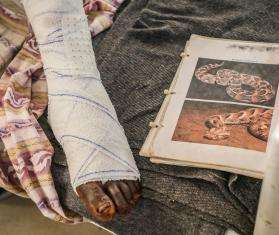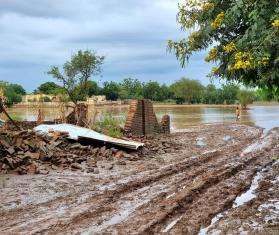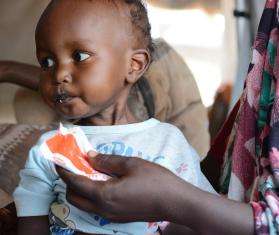In Aboutengue camp, nearly 44,500 Sudanese refugees—the majority of whom are women and children—face severe cuts to food rations and poor living conditions due to a lack of adequate shelter.
"Life here is tragic compared to Sudan [prior to the war]," says Jimiya, who arrived in Aboutengue with her family in July 2023. "At first, we were given enough food, but now the rations have decreased. Recently, we only got sorghum and oil, which are hard to cook without fresh ingredients. We don’t have enough to sustain our family, especially the children."
Since February, food rations have been progressively reduced. Uncertainty about funding has led to significant supply disruptions and delays.
“We are paying close attention to these recurrent shortages in food distributions,” says Danielle Borges, MSF emergency coordinator in eastern Chad. “It would be devastating if the gaps in this humanitarian response create an additional food crisis in these camps.”
Mariam
"The food we receive is not enough, and we cannot make it through the month with what we’re given. Not only has the quantity decreased, but so has the variety. We used to receive beans in the rations, which were ideal for lunch, but not anymore.
Water is also insufficient. The water points we rely on are shared by too many people, and with the size of our family, we need to refill our jerrycan twice a day ...

Geographic isolation presents challenges
Aboutengue camp is located in a remote area with very few livelihood opportunities. Its geographic isolation makes refugees even more dependent on this inadequate food assistance.
“One of the few livelihood opportunities that exist for women in Aboutengue camp involves collecting firewood in the surrounding forests and selling it for a handful of pounds due to the lack of sufficient food supply and financial support,” says Atsuhiko Ochiai, MSF project coordinator. “This activity puts the women at risk of violence, but it has become so vital for them that they have no other choice. Unfortunately, stories of women being assaulted in the forest continue.”
"Sometimes, when we’re in the forest, some people threaten us, saying we’re not allowed to collect wood,” says Aziza, a Sudanese refugee and mother of seven children, who has lived in the camp since July of last year. “Some of us have even been beaten.”
A bundle of dry branches sells for the equivalent of about $1-3 in the informal markets that have sprung up around the camp. The lack of resources and food means that refugees have no choice but to continue collecting firewood in order to survive.
Aziza
"Life in the camp is difficult. We’re living with a lot of hardships. We don’t have enough food. Food distributions happen once a month, but the rations are so small that we usually run out of food long before the next distribution ... We are lacking everything. I was supposed to work today, but I’m sick ...
When I compare what our lives used to be in Sudan before the war to what we have now, it really troubles me. All we want is to live with dignity, like we used to."

Surviving on one meal a day
Decreasing food portions could lead to rising malnutrition rates, particularly among children. "In Aboutengue camp, MSF is treating hundreds of children each month for moderate and severe acute malnutrition,” warns Borges. “We’re concerned this situation could worsen if the food shortages continue.”
In Metché, two hours from Adré, the situation is similarly alarming. Many refugees are now surviving on just one meal a day. While in recent months food distributions have taken place both in Metché and the nearby camps of Alacha and Arkoum, refugees receive low number of calories per portion.
Jimiya
"We know the NGOs here are working hard, but we need enough food. We also need training for work opportunities—technical skills like sewing—so we can sustain our families. And we hope to receive proper shelters soon. We’ve built one ourselves, but it’s temporary shelter. We don’t have mattresses, cooking utensils, blankets, or mats. There isn’t enough space for 10people, so we built two shelters, but we only got plastic sheeting for one. The plastic isn’t enough when it rains heavily."

The inpatient therapeutic feeding center is the busiest ward at MSF’s Metché hospital, facing an increase in the number of children with severe acute malnutrition with complications arriving from Alacha and Arkoum camps from January to August. Between early August and September, 11 children in Metché have experienced relapses after being discharged.
There is an urgent need for increased nutritional support and logistical solutions to prevent further deterioration.
The refugees’ plight is compounded by the lack of sustained and planned funding for the humanitarian response. "The prevailing feeling is that this crisis is being neglected by major donors," says Borges. "Without immediate and substantial support, we risk seeing an even greater humanitarian disaster unfold in this region."
"We are grateful for the help we’ve received from the NGOs," says Jimiya, "but we need enough food, proper shelter, and work opportunities to live with dignity, like we used to."
About our work in Aboutengue camp
For over a year, MSF has been providing essential medical care, water, and sanitation support to refugees in Aboutengue camp, including treatment for malnutrition and the distribution of basic supplies like soap, mosquito nets, and jerrycans. Around 14,000 refugees still lack proper shelter and continue to live in makeshift structures under extremely harsh conditions.




